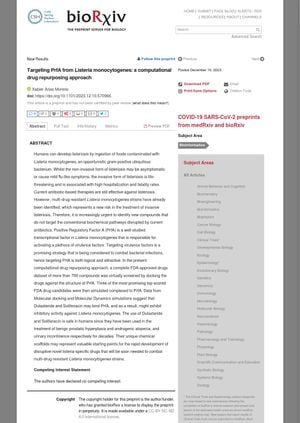Targeting PrfA From Listeria Monocytogenes: A Computational Drug Repurposing Approach
December 2023
in “
bioRxiv (Cold Spring Harbor Laboratory)
”

TLDR The research suggests Dutasteride and Solifenacin may be effective against the bacterium causing listeriosis.
The study "Targeting PrfA from Listeria monocytogenes: a computational drug repurposing approach" explores a new method to combat the bacterium Listeria monocytogenes, which causes the life-threatening disease listeriosis. The researchers used a computational approach to screen over 700 FDA-approved drugs against the structure of a key virulence factor in the bacterium, Positive Regulatory Factor A (PrfA). The study identified Dutasteride and Solifenacin as potential inhibitors of PrfA, suggesting they could be effective against Listeria monocytogenes. These drugs are already approved for use in humans for benign prostatic hyperplasia and androgenic alopecia, and urinary incontinence respectively, which could expedite their potential use against listeriosis, especially in the face of multi-drug resistant strains.





